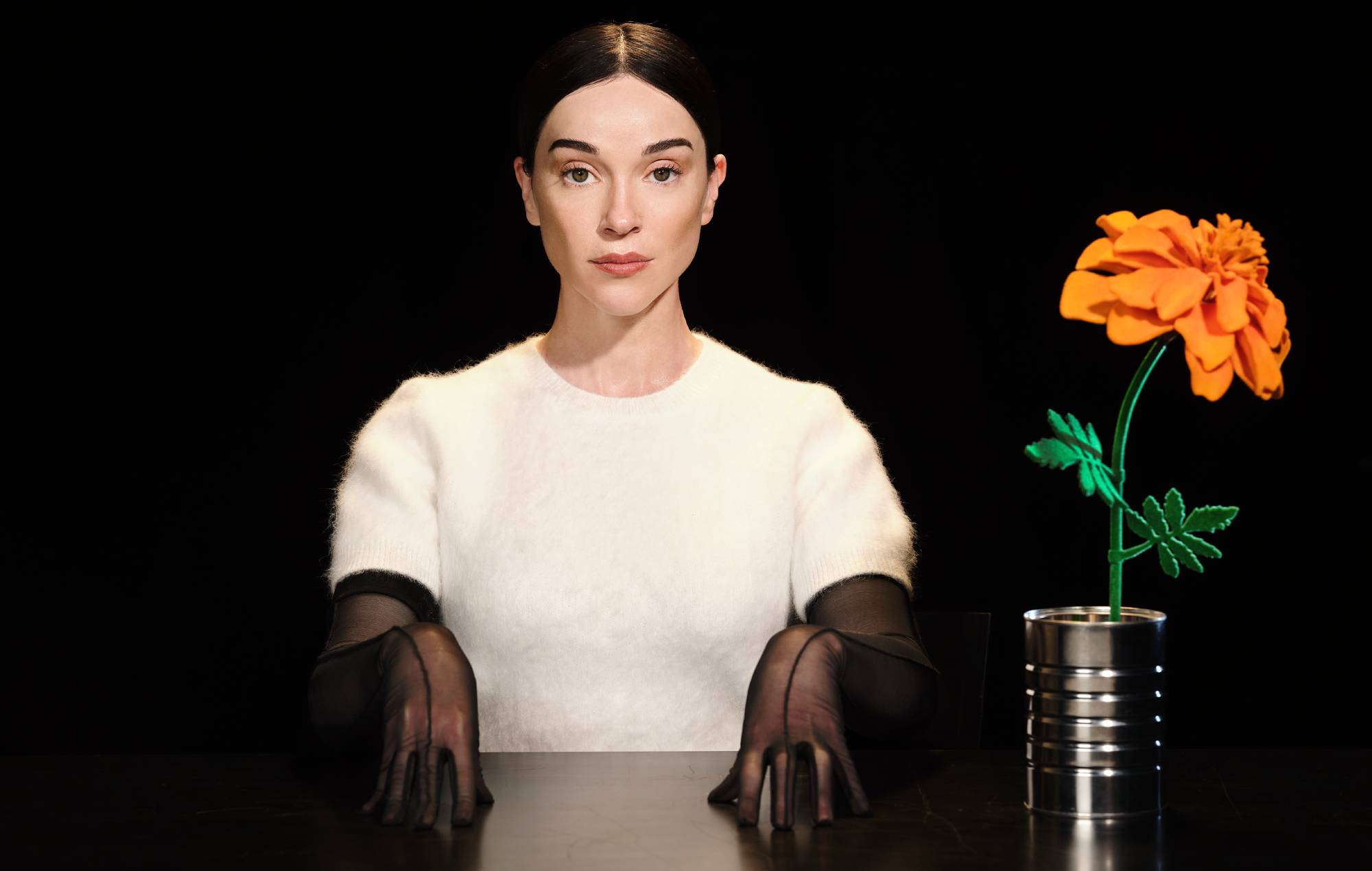St. Vincent: ‘Life can be impossible, but we only get one of them’
As she gears up to release 'All Born Screaming', St Vincent tells Rolling Stone UK how life – in all its glory and sadness – informed her latest album.
By Nick Reilly

“We forget that the suffering and beauty is all part and parcel of the same thing and I don’t know if you get one without the other,” St. Vincent tells Rolling Stone UK from her New York home. “If you lose someone, you suffer in equal measure to how much you loved. There’s no way around it, you’ve got to go through it.”
It’s a particularly profound point to hit on, but one that makes sense when you’re chatting about All Born Screaming, the latest album from the guitar virtuoso born Annie Clark.
As that title suggests, it’s a reflection of life’s eternally chaotic nature and the harsh pay-offs we accept as the price of joy. Grief and sadness, for Clark, have been but two of these.
In turn, it’s arguably the closest we’ve ever got to exploring who Annie Clark is in the here and now. Before now, persona and alter-egos, had formed a huge part in Clark’s work. Her last album – the personal Daddy’s Home – saw her channel “Natasha Kinsky in Paris, Texas through a Tarantino lens,” while 2017’s Masseducation saw her explore the idea of a “mental institution dominatrix”.
But on All Born Screaming, it’s a deeply honest reflection of life, death and Clark’s own experiences of grief. It’s a record of two halves – the first half leans heavily on Clark’s generational guitar playing to deliver some of the biggest riffs of her career so far. The second, meanwhile, is a more sedate and subtle affair. It’s the duality of life, as Clark puts it. It can be tough, but – as the singer tells us – we only get one of them. You can read our full Q&A with St. Vincent below.
Hello, Annie! Where do we find you?
I’m in bed in New York City. I flew in on a red eye from LA a couple of nights ago and people don’t want to talk about the jet lag from that journey. The three-hour time difference, it’s under-represented! It’s kind of something and it’s the black sheep of the jet lag community.
So between the Red Eye and landing and doing press all day yesterday, I accidentally overslept and missed my first interview today. I never do that!
I feel like you’re forgiven, given that hectic schedule.
We’ll see. Only God will tell. But I’m fucking ripping through these in bed, which is nice.
And only weeks away from the release of All Born Screaming. Are you excited to have it out in the wild?
It’s funny because the whole thing is this idea of finishing it and then you go OK, this is the best rendering of this vision that I can possibly make. And then you just spend a long time talking about it, which is sort of a hilarious disconnect from the music itself. Once it comes out, I feel, in a certain way, I’m done because it’s not for me anymore. I mean that in the best way, it’s for everybody else and they bring their own lives to it and the listener can complete the song.
What’s your relationship like with explaining the creation of your music. It can sometimes be an uneasy thing for artists?
Well, it’s a funny one because I do feel very strongly now that I don’t want to say too much about a song. Not because I’m trying to be cagey and elusive, but because I want a listener to hear it and mean anything it means to them. I don’t need to knock on their door when they’re enjoying something and say actually you’re not enjoying it! That’s not what this is about and that would feel ungenerous to me. The whole thing is mysterious to me too. I don’t know where songs come from, how they emerge. I just go in my studio and work and work until a song reveals itself to me.
I’m writing about what’s going on in my life and whatever this psychic antenna we have as artists has picked up. That’s why I’m trying to make something and take chaos and violence and brutality and all that and make something that helps me make sense of my life. It is a funny construct to then just go let me talk about it, when I don’t know what it sometimes is!

What do you think is the resounding story of this record?
It’s a record about life and death and love and it’s just very close to the bone and just close to my heart. It’s not a deconstruction of persona or anything like that. It’s just me.
That’s interesting, given the amount of persona that has existed in your music before.
Look, on my last album I was trying to channel Gena Rowlands in A Woman Under The Influence, Natasha Kinsky in Paris, Texas through a Tarantino lens. I’ve been interested with playing with persona on past albums and that makes all the sense in the world to me because I’m queer. I know how to code switch, I’ve been playing with identity since I was a child. Of course this was gonna come out in my work. And it was a way for me at the time to get to the truth.
But that’s not what this record is about. It’s about life and death and love. I think it would be simplistic to say I did characters but now I’m really me. First of all, that’s reductive of the art and it represents what was going on in my life. I’m careful not to cast aspersions on my previous work. That was authentic and this is authentic too.
It’s an album of two halves. The first – complete with a cameo from Dave Grohl – doesn’t relent in its intensity. The second is a calmer proposition altogether.
Yeah, the first half is a bit of a season in hell and I think it deals with grief, self-loathing, internal and external violence and saying life is impossible. The second half, to me, says yes, life *is* impossible but we get to live it and we’ve only got one of them. Life is very short. I’m keenly aware of that, now more than ever.
It ends on ‘All Born Screaming’ too. An ecstatic mantra, we are all in this together. We forget that the suffering and beauty is all part and parcel of the same thing in life and I don’t know if you get one without the other. If you lose someone, you suffer in equal measure to how much you loved. There’s no way around it, you’ve got to go through it.
This sounds like a very specific experience of grief that you’ve been through.
Well every song is lived experience and in the past few years I’ve lost people young and old and there’s no fucking rhyme or reason to it. And in a certain way, that grief is very clarifying because it makes you go, ‘This matters and this doesn’t matter at all’. I’m just going to focus on what matters. That’s universal though isn’t it? Everyone has that experience of crossing the rubicon. We all do.
You mentioned earlier about getting to live one life. It’s an optimistic mindset. Have you always been like that?
I don’t know, there have definitely been certain times in my life where I was so clouded by nerves that I probably couldn’t see the light and there’s been various times of real darkness, personally. But I think making work that you love and that you believe in is my faith, that’s my religion and music has saved me on many occasions. Because even if I was personally shattered, I had this place to go with it and I had this thing to make that I was compelled to make. Making things is an act of hope and an act of optimism. At this moment in my life I’m an optimist with an asterisk. In the big picture there are some things better than they’ve ever been. Even just being a musician and talking to you about this process. 70 years ago I’d have probably been a housewife. There’s a lot of things that are the same as they ever were. The only new thing left for us to experience on this planet would be peace.
One song that really struck me on the album was ‘Violent Times’. It sounds like a Bond theme, Annie.
Absolutely! It was not intentional when I was writing the song whatsoever, but I have noticed that and yeah, I totally hear it.
If Barbara Broccoli came calling and asked you to do the next Bond theme, would you go for it?
Hell yeah! I love those movies. Can we just put ‘Violent Times’ in there as the song? Stick it straight in, because if she’s reading this it’ll save me a hell of a lot of work.
‘Sweetest Fruit’ floored me. It’s a really profound tribute to the late, great, taken-too-soon producer SOPHIE.
I was a fan of SOPHIE’s from afar but we never met. I didn’t set out to write this tribute in the same way I never set out to write anything you know? It just sort of comes. But that song was the extended product of a jam session and I loved that we could make a song around that. I read about the circumstances of her death and it was so tragic, but this idea that she was an artist who was always reaching for new things and taking risks, right? And this idea that she was just trying to get a better look at the moon. That moved me because there are a lot of us in human history, people looking for something on the outer reaches.
There’s that Leonard Cohen line – “I came so far from beauty” – and maybe it doesn’t pan out, but it’s a noble act to go out on a limb to try and find something really beautiful. It’s such a fraught territory and I didn’t necessarily want to mention it was for her, because it could get twisted and turned into something ugly. As artists, you can feel a camaraderie with artists if you like their work, even if you don’t know them. And I like this idea that we’re all fighting the same fight, we’re all part of the same army so when you see somebody go down, it’s very heartbreaking.
And finally, this is your first album to be solely self-produced. How does that change your relationship with the songs?
I started recording myself when I was 14. Every record I’ve ever made I’ve co-produced, I’ve had the technological knowledge to get in there and do what I wanted. But in this case, sound is meaning and a lot of these songs didn’t necessarily start from a melody or a lyric, they started from sound. I was in my studio, over-caffeinated, micro-dosing on mushrooms and making sounds with modular synths and analog drum machines and just jamming, just finding sounds that I thought were exciting. I will forever love people like J Dilla or dub masters like Lee Scratch Perry and King Tubby. That kind of production that is so tactile, is just so sexy to me. I played with sound for hours, I jammed and maybe only four seconds was something I could build a song around and that’s how ‘Broken Man’ came about, but sound really does have meaning.
